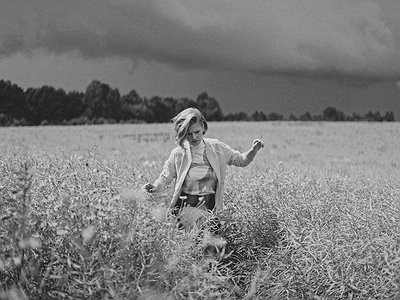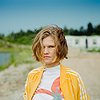Part 2
Take us through a day in your life, from a possible morning routine through to your work, please. Do you have a fixed schedule? How do music and other aspects of your life feed back into each other - do you separate them or instead try to make them blend seamlessly?
I’m a slow awakener, love slow mornings, abundant breakfasts with a big jar of coffe that I prefer to enjoy at a leisurely pace. This is my nature.
Everything else is more variable depending on the season, location or responsibilities. I have spent this summer in my country house so part of the day I’m in the greenhouse taming tomatoes or in the garden. Then there’s always some unanswered emails I need to deal with. Preparing lunch! Ideally I would then work a few hours with music. Preparing dinner! Continue making music maybe, or sauna, chatting with the cats.
But the reality of past weeks was totally different as I had to build up a totally new live setup and performance around the latest album Hinged. I did my slow morning thing and then worked restlessly nonstop until late nights, without eating much, not caring for the garden, and like that for several weeks in a row. So I think it’s fair to say sometimes things blend and sometimes they don't blend at all.
Can you talk about a breakthrough work, event or performance in your career? Why does it feel special to you? When, why and how did you start working on it, what were some of the motivations and ideas behind it?
Breakthrough somehow sounds too definitive. There have been a number of moments that seem like taking a large step forward but I consider it as a part of an ongoing process. Because at the minute I’m done I already see the next ditch that needs to be crossed.
There are many descriptions of the ideal state of mind for being creative. What is it like for you? What supports this ideal state of mind and what are distractions? Are there strategies to enter into this state more easily?
It’s when you feel flowing and connected with what you do, when little things lead to new discoveries, the landscape around you is becoming more and more spatial and details find their place in it. Distractions are outside that space: an incoming call, accidentally looking at your inbox or some silly everyday thing ... so the best strategy to keep my mind focused is to remove these factors and keep the working sessions private (that’s me lecturing myself).
In the past I used to be creatively very effective in stressy or extreme situations but not anymore ... I may be effective but deeply dislike the feeling of pressure and anxiety it adds to the creative process. Oh, and the different times of day or night have their own energy. I’m constantly torn between sleeping or making music throughout the night, both being my passions.
Music and sounds can heal, but they can also hurt. Do you personally have experiences with either or both of these? Where do you personally see the biggest need and potential for music as a tool for healing?
I’m obviously sensitive to sounds so yes, have experienced music in all possible ways. I strongly believe that the more people make music the more satisfied societies would be.
There is a fine line between cultural exchange and appropriation. What are your thoughts on the limits of copying, using cultural signs and symbols and the cultural/social/gender specificity of art?
Uuh … that’s a complex yet important one. It comes down to how we treat each other. Appropriation itself is a millenia-old phenomenon but critical awareness towards it appeared much later. Using something without knowing its meaning in the original context often happens due to ingnorance, or more sadly, using a dominant position and being unrespectful. At the same time, cultures do change and in today’s world we’re constantly exposed to so many different influences. There are also examples of cultural borrowings leading to the birth of a new and exciting phenomenon.
But what about time frame - when does something expire and how to feel about using something that was created in the distant past by someone who’s world view doesn’t meet the values of modern society? The ever rising question - can you separate the artist from the art?
I do have a quite telling personal experience related to this. On my previous duo album with Ruum there’s a beautiful ballad ‘Cloths of Heaven’, lyrics written by W. B. Yeats. It was my ignorance that I wasn’t aware of Yeats’ political views nor his obsession over Renaissance Italy and the Orient (which lead to something we could consider as creative appropriation) before the album was all ready to be announced. The day before the first press release was supposed to be sent out, our UK publicist wrote that unfortunately she’s not able to work with us as we use a poem by Yeats - and that is romanticising the work of a famous fascist, misogynist, homophobe and goes against everything she believes in.
What about context? That poem was written in 1889 before Yeats started getting involved in politics and hankered for Irish independence, a poem to the love of his life who never returned his feelings. And a bit of irony too ... his nationalist views were mostly to do with fighting against colonialism and the British Empire. I do not in any way justify his views but I also don’t believe in deleting history. Having researched traditional music there’s no way we can trace back every single detail about an ancient song, take, as an example something very grim - The Husband Killer. Or moreover, there is no single 'correct interpretation' that lasts through times ... And nobody wouldn’t even question it as the source has become anonymous.
Those old songs are constantly re-created and given new meanings as time and values change. But how much time has to pass for a poem or melody to become free? We have a copyright law that says it is 70 years after the authors death. No law can regulate emotional associations or collective memory though.
Personally, if something inspires me I naturally want to know more about the source and context (except that one time haha!). I consider it important to do proper research before using something from another culture, also to make sure your behaviour does not hurt anyone in vain. And give credit to people!
Our sense of hearing shares intriguing connections to other senses. From your experience, what are some of the most inspiring overlaps between different senses - and what do they tell us about the way our senses work?
Synesthesia! There was a period in my life when I was really interested in that subject, that’s when I found out that there were more people who “saw” sounds. I sometimes perceive them as textures (which could also be reflected in my sense of body or feel as if I’m touching it) and I see a piece of music as some kind of articulated space / landscape that is constantly moving. And colours, they do taste a bit, don’t they? It tells us that our senses make up a wild forest with the underground network of trees. (laughs)
Art can be a purpose in its own right, but it can also directly feed back into everyday life, take on a social and political role and lead to more engagement. Can you describe your approach to art and being an artist?
I’ve never wanted to impose my interpretations on others but rather to create an open space and room for possibilities. Some projects or musical pieces reveal themselves only gradually, for example performing them a certain amount of times could refine or even change the meaning of it to me. My art is the expression of my questionings and reflections – the creative process is like a filter system that helps me to better understand myself and the world. Maybe that is why I often find it interesting to return to old musical material and reassemble it in a new way ... from a different perspective.
I find it worrying how there have been attempts in some places to put traditional music at the service of right-wing populism. On the other hand it can also be the voice of the opposition. I still believe that music could be a unifying force for people. So while standing on stage, my values and beliefs stand there too. But I prefer to open a dialogue and hope that my inspirations also inspire some listeners.
What can music express about life and death which words alone may not?
Words alone express nothing, we’re the ones who give them meaning and we all use and perceive these individually, so potentially words could express anything we wanted. The same goes for music. But music also has the ability to alter our state of mind (I guess some people feel the same about words) and exist without having to give meaning to it.
I feel the magic of music the most when it triggers you into a sort of liminal state of mind where time stops.






